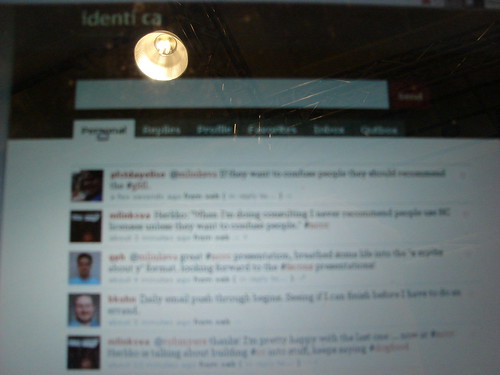After about five years (2.5 year update) it’s hard not to be disappointed in the state of the federated social web. Legacy silos have only increased their dominance, abetting mass spying, and interop among federated social web experiments looks bleak (link on different topic, but analogous).
In hindsight it was disappointing 5 years ago that blogs and related (semweb 1.0?) technologies hadn’t formed the basis of the federated social web (my pet theory is that the failure is in part due to the separation of blog post/comment writing and feed reading).
Another way of looking at it is that despite negligible resources focused on the problem, much progress has been made in figuring out how to do the federated social web over the past five years. Essentially nothing recognizable as a social web application federated five years ago. There are now lots of experiments, and two of the pioneers have learned enough to determine a rewrite was necessary — Friendica→Red and the occasion for this post, StatusNet→pump.io.
Right now is a good time to try out a federated social web service (hosted elsewhere, or run your own instance) again, or for the first time:
My opinion, at the moment: pump.io has the brightest future, Diaspora appears the most featureful (inclusive of looking nice) to users, and Friendica is the best at federating with other systems. Also see a comparison of software and protocols for distributed social networking and the Federated Social Web W3C community group.
The Indie Web movement is complementary, and in small part might be seen as taking blog technologies and culture forward. When I eventually rebuild a personal site, or a new site for an organization, indieweb tools and practices will be my first point of reference. Their Publish (on your) Own Site, Syndicate Elsewhere and Publish Elsewhere, Syndicate (to your) Own Site concepts are powerful and practical, and I think what a lot of people want to start with from federated social web software.
*Running StatusNet as I write, to be converted to pump.io over the next hours. The future of StatusNet is to be at GNU social.

[…] relevant public domain and Creative Commons articles. The first entry in this experiment is a recent post by Mike Linksvayer. Since Free and Open Source Software as well as Free Culture are important to […]
[…] If you want FLOSS alternatives to GMail and Google Groups, commercial ones include MyKolab and OnlineGroups respectively. Both are expensive; a post explaining why MyKolab is. If you’re politically aligned, Riseup provides mail and lists (their NSA statement; I’m surprised I haven’t seen the string alternastructure until now). Mailman 3⸮ And if you want everything to move to social-networky-but-free platforms, not much has changed since 3 months ago. […]
[…] extortion (original) of mine, and on another of his blogs, on post on the federated social web (original). I appreciate the experiment, which the latter is tiny bit relevant to, mentioning that blog […]
[…] Stun all by bringing LibreOffice and OpenOffice together. GNOME, KDE, and Unity as well. How about federated social web […]
[…] mentioned previously, the IndieWeb movement is bringing blog culture and technology forward. Watch Kevin Marks’ […]
[…] Commons, crowdfunding, Defensive Patent License, Document Freedom Day, DRM-in-HTML5 outrage, EFF, federated social web, Internet Archive, Open Knowledge Foundation, SOPA/ACTA online protests, surveillance outrage, and […]
[…] Mostly because this would be a boost to the so far disappointing and fractured federated social web. […]